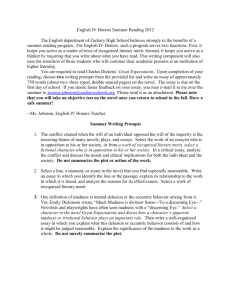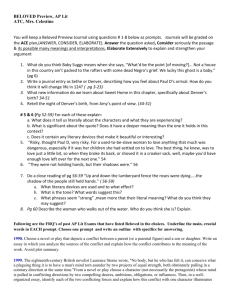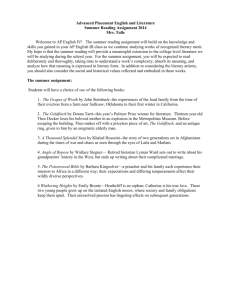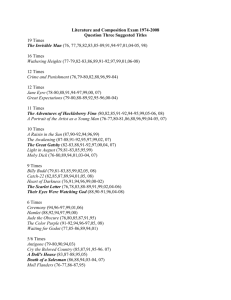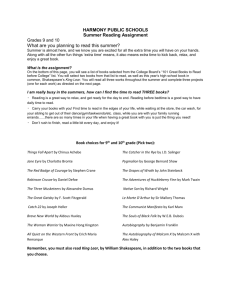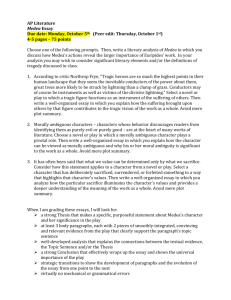AP Literature: Crime and Punishment Quotes to consider: "Why am I
advertisement
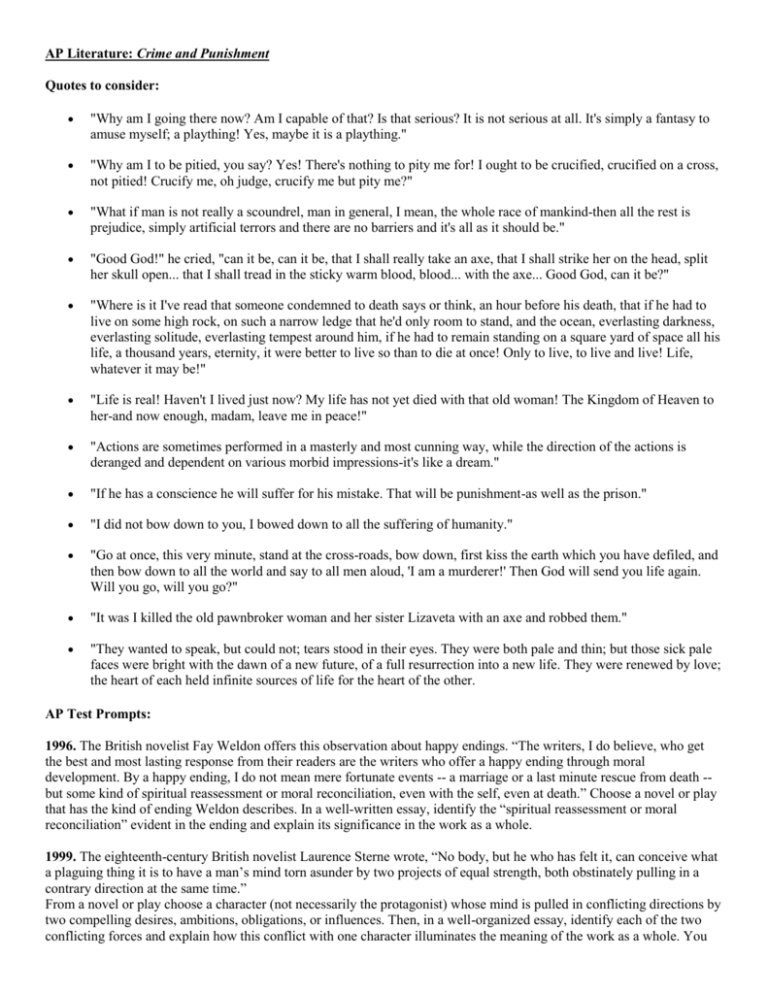
AP Literature: Crime and Punishment Quotes to consider: "Why am I going there now? Am I capable of that? Is that serious? It is not serious at all. It's simply a fantasy to amuse myself; a plaything! Yes, maybe it is a plaything." "Why am I to be pitied, you say? Yes! There's nothing to pity me for! I ought to be crucified, crucified on a cross, not pitied! Crucify me, oh judge, crucify me but pity me?" "What if man is not really a scoundrel, man in general, I mean, the whole race of mankind-then all the rest is prejudice, simply artificial terrors and there are no barriers and it's all as it should be." "Good God!" he cried, "can it be, can it be, that I shall really take an axe, that I shall strike her on the head, split her skull open... that I shall tread in the sticky warm blood, blood... with the axe... Good God, can it be?" "Where is it I've read that someone condemned to death says or think, an hour before his death, that if he had to live on some high rock, on such a narrow ledge that he'd only room to stand, and the ocean, everlasting darkness, everlasting solitude, everlasting tempest around him, if he had to remain standing on a square yard of space all his life, a thousand years, eternity, it were better to live so than to die at once! Only to live, to live and live! Life, whatever it may be!" "Life is real! Haven't I lived just now? My life has not yet died with that old woman! The Kingdom of Heaven to her-and now enough, madam, leave me in peace!" "Actions are sometimes performed in a masterly and most cunning way, while the direction of the actions is deranged and dependent on various morbid impressions-it's like a dream." "If he has a conscience he will suffer for his mistake. That will be punishment-as well as the prison." "I did not bow down to you, I bowed down to all the suffering of humanity." "Go at once, this very minute, stand at the cross-roads, bow down, first kiss the earth which you have defiled, and then bow down to all the world and say to all men aloud, 'I am a murderer!' Then God will send you life again. Will you go, will you go?" "It was I killed the old pawnbroker woman and her sister Lizaveta with an axe and robbed them." "They wanted to speak, but could not; tears stood in their eyes. They were both pale and thin; but those sick pale faces were bright with the dawn of a new future, of a full resurrection into a new life. They were renewed by love; the heart of each held infinite sources of life for the heart of the other. AP Test Prompts: 1996. The British novelist Fay Weldon offers this observation about happy endings. “The writers, I do believe, who get the best and most lasting response from their readers are the writers who offer a happy ending through moral development. By a happy ending, I do not mean mere fortunate events -- a marriage or a last minute rescue from death -but some kind of spiritual reassessment or moral reconciliation, even with the self, even at death.” Choose a novel or play that has the kind of ending Weldon describes. In a well-written essay, identify the “spiritual reassessment or moral reconciliation” evident in the ending and explain its significance in the work as a whole. 1999. The eighteenth-century British novelist Laurence Sterne wrote, “No body, but he who has felt it, can conceive what a plaguing thing it is to have a man’s mind torn asunder by two projects of equal strength, both obstinately pulling in a contrary direction at the same time.” From a novel or play choose a character (not necessarily the protagonist) whose mind is pulled in conflicting directions by two compelling desires, ambitions, obligations, or influences. Then, in a well-organized essay, identify each of the two conflicting forces and explain how this conflict with one character illuminates the meaning of the work as a whole. You may use one of the novels or plays listed below or another novel or work of similar literary quality. 2000. Many works of literature not readily identified with the mystery or detective story genre nonetheless involve the investigation of a mystery. In these works, the solution to the mystery may be less important than the knowledge gained in the process of its investigation. Choose a novel or play in which one or more of the characters confront a mystery. Then write an essay in which you identify the mystery and explain how the investigation illuminates the meaning of the work as a whole. Do not merely summarize the plot. 2001. One definition of madness is “mental delusion or the eccentric behavior arising from it.” But Emily Dickinson wrote Much madness is divinest SenseTo a discerning EyeNovelists and playwrights have often seen madness with a “discerning Eye.” Select a novel or play in which a character’s apparent madness or irrational behavior plays an important role. Then write a well-organized essay in which you explain what this delusion or eccentric behavior consists of and how it might be judged reasonable. Explain the significance of the “madness” to the work as a whole. Do not merely summarize the plot. 2002. Morally ambiguous characters -- characters whose behavior discourages readers from identifying them as purely evil or purely good -- are at the heart of many works of literature. Choose a novel or play in which a morally ambiguous character plays a pivotal role. Then write an essay in which you explain how the character can be viewed as morally ambiguous and why his or her moral ambiguity is significant to the work as a whole. Avoid mere plot summary. 2003. According to critic Northrop Frye, “Tragic heroes are so much the highest points in their human landscape that they seem the inevitable conductors of the power about them, great trees more likely to be struck by lightning than a clump of grass. Conductors may of course be instruments as well as victims of the divisive lightning.” Select a novel or play in which a tragic figure functions as an instrument of the suffering of others. Then write an essay in which you explain how the suffering brought upon others by that figure contributes to the tragic vision of the work as a whole. 2005. In Kate Chopin’s The Awakening (1899), protagonist Edna Pontellier is said to possess “That outward existence which conforms, the inward life that questions.” In a novel or play that you have studied, identify a character who outwardly conforms while questioning inwardly. Then write an essay in which you analyze how this tension between outward conformity and inward questioning contributes to the meaning of the work. Avoid mere plot summary. 2010. Palestinian American literary theorist and cultural critic Edward Said has written that “Exile is strangely compelling to think about but terrible to experience. It is the unhealable rift forced between a human being and a native place, between the self and its true home: its essential sadness can never be surmounted.” Yet Said has also said that exile can become “a potent, even enriching” experience. Select a novel, play, or epic in which a character experiences such a rift and becomes cut off from “home,” whether that home is the character’s birthplace, family, homeland, or other special place. Then write an essay in which you analyze how the character’s experience with exile is both alienating and enriching, and how this experience illuminates the meaning of the work as a whole. Do not merely summarize the plot. 2011. In a novel by William Styron, a father tells his son that life “is a search for justice.” Choose a character from a novel or play who responds in some significant way to justice or injustice. Then write a welldeveloped essay in which you analyze the character’s understanding of justice, the degree to which the character’s search for justice is successful , and the significance of this search for the work as a whole.

